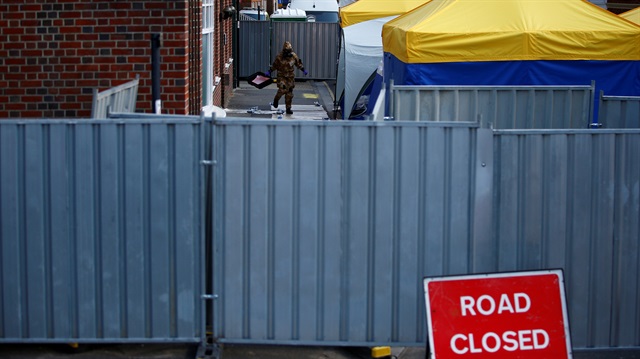

A forensic investigator, wearing a protective suit
People using the same passports as two men accused by Britain of the attempted murder of a former Russian spy and his daughter travelled widely in Europe and made a previous trip to Britain, according to an online Russian news outlet.
Russian citizens identified as Alexander Petrov and Ruslan Boshirov were charged in absentia by Britain on Wednesday with trying to murder Sergei Skripal and his daughter Yulia with a military-grade nerve agent in England.
British authorities have said the men were Russian military intelligence agents travelling with genuine Russian passports, but under aliases.
The Kremlin denied that Russia had been in any way involved in the poisoning, describing British accusations that an attack had been approved by senior Russian officials as "unacceptable".
Fontanka said people using the passports in the names of Petrov and Boshirov travelled to Amsterdam, Geneva, Milan and Paris on multiple occasions between September 2016 and March 2018. A person using Petrov's passport travelled to London at least once before the Skripals were poisoned, for a visit from Feb. 28.
Fontanka, an independent Russian media outlet with a strong track record of investigative reporting, did not disclose the source of its information.
Yulia Skripal and her father Sergei, a former colonel in Russian military intelligence who betrayed dozens of agents to Britain’s MI6 foreign spy service, were found unconscious on a public bench in the British city of Salisbury on March 4.
They were in hospital for weeks and have both now been discharged.
Britain said they were poisoned with the Novichok nerve agent developed in Russia, and that it was highly likely the Russian state had tried to murder them. The case brought the biggest round of East-West diplomatic expulsions since the Cold War.
Russia said British authorities had failed to produce any evidence of Russian involvement in the poisoning and showed no interest in conducting a thorough investigation.
A woman later died from Novichok poisoning after her partner found a counterfeit perfume bottle which police believe had been used to smuggle the nerve agent into Britain.
The Russian foreign ministry said in a statement released late on Wednesday that a speech by British Prime Minister Theresa May threatening Russia with retaliation over the poisoning was delivered in an "unacceptable tone."
Referring to May's accusations of Russia's involvement in the poisoning, the statement said: "We decisively reject these insinuations."
#EU
#Russia
#Spies
#Skripal

